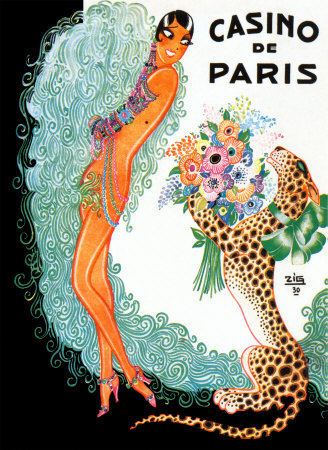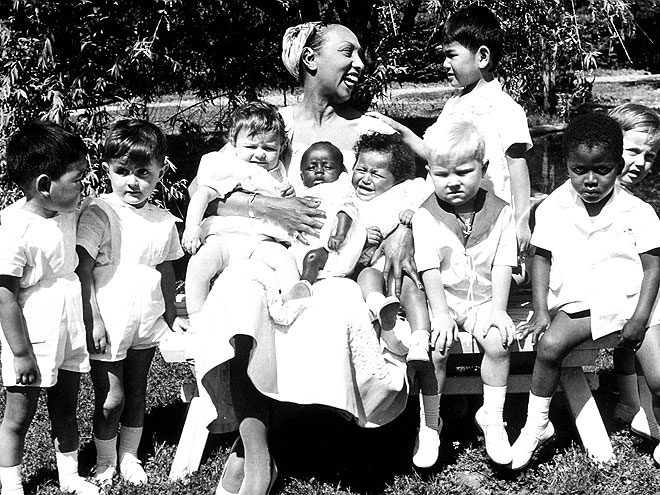Though Josephine was American-born, her opportunites in the states were limited due to the racial prejudices of audiences. Parisians were anxious to enjoy something new, but it should be noted that the racial element was part of what appealed to French audiences. She was brought overseas to perform in La Revue Negre, a show designed to highlight tribal black colonial culture. Posters featured caricatures of blacks complete with oversized lips. Though the graphic art of Paul Colin (who became one of Josephine's lovers) made her famous with its irresistable allure, it also sexualized her. That being said, Josephine seemed utterly comfortable in her skin and exhibited no shame. I even watched a clip of a performance from 1974, at age 68, where Josephine sported a skintight turquoise jumpsuit with an enormous plumed headpiece. She looks absolutely ageless and still quite sexy. She died the following year of a heart attack.
During her sixty-nine years, Josephine lived an adventurous life. She married, and divorced, four times--but always supported herself. She set Paris on fire with her entertainment and sang most of her tunes in French. She participated in the French Resistance, delivering secret messages written in her sheet music, and entertained troops. She loved children and pets. The poster above shows her cheetah, Chiquita, one of many exotic/unusual pets she owned. She also adoped twelve children, of a variety of racial and ethnic backgrounds. She called them her "rainbow tribe" and took great pride in showcasing how a family could encompass all sorts of traditions lovingly and happily.
Toward the end of her life, Josephine performed at Carnegie Hall where she received a standing ovation. She truly valued the love and acceptance she felt from her American audience, but it is a bit sad that she had to wait so long to feel that way.
Lessons from Josephine's Life:
- Sometimes environment really is the problem. I'm not a big fan of the "geographic cure" (too many people place false hope in a change of locale meaning a change of life). However, if you are in a toxic environment then you cannot do your best work, or be your best self. If your household, workplace, place of worship or club environments feel unhealthy, then you need to figure out how leaving or changing those places may be what is needed.
- Be bold! Josephine relished her strong, sexy body and shook that banana skirt with confidence. Sometimes you just have to put it all out there. That boldness and bravery carried through to her contribution fighting the Nazis.
- Fight when the time is right. The 1920's and 30s didn't offer Josephine an environment to try to affect racial change, but the 1950s and 60s did. Sadly, sometimes you have to bide your time.
- You can create a family. Through adoption (children and pets), through friendships, and fostering.
Enjoy the clip below and perhaps check out some jazz music this month. It's our American arts heritage and it owes much to the contributions of black musicians, writers and performers.
https://www.youtube.com/watch?v=zUbUaBwLnMA
Artfully yours, Lisabeth


 RSS Feed
RSS Feed